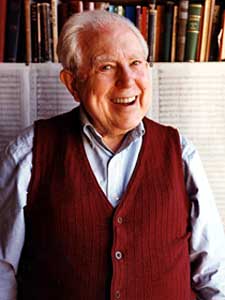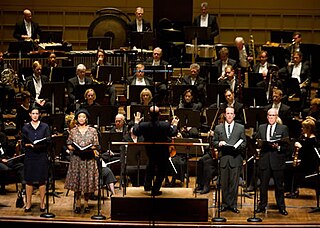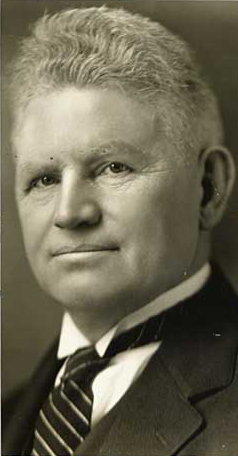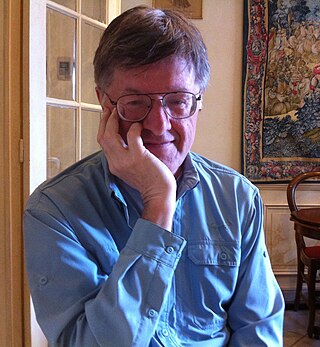Shulamit Ran is an Israeli-American composer. She moved from Israel to New York City at 14, as a scholarship student at the Mannes College of Music. Her Symphony (1990) won her the Pulitzer Prize for Music. She was the second woman to win the Pulitzer Prize for Music, the first being Ellen Taaffe Zwilich in 1983. Ran was a professor of music composition at the University of Chicago from 1973 to 2015. She has performed as a pianist in Israel, Europe and the U.S., and her compositional works have been performed worldwide by a wide array of orchestras and chamber groups.

Elliott Cook Carter Jr. was an American modernist composer. One of the most respected composers of the second half of the 20th century, he combined elements of European modernism and American "ultra-modernism" into a distinctive style with a personal harmonic and rhythmic language, after an early neoclassical phase. His compositions are performed throughout the world, and include orchestral, chamber music, solo instrumental, and vocal works. The recipient of many awards, Carter was twice awarded the Pulitzer Prize for his string quartets; he also wrote the large-scale orchestral triptych Symphonia: sum fluxae pretium spei.
A tone cluster is a musical chord comprising at least three adjacent tones in a scale. Prototypical tone clusters are based on the chromatic scale and are separated by semitones. For instance, three adjacent piano keys struck simultaneously produce a tone cluster. Variants of the tone cluster include chords comprising adjacent tones separated diatonically, pentatonically, or microtonally. On the piano, such clusters often involve the simultaneous striking of neighboring white or black keys.
George Rochberg was an American composer of contemporary classical music. Long a serial composer, Rochberg abandoned the practice following the death of his teenage son in 1964; he claimed this compositional technique had proved inadequate to express his grief and had found it empty of expressive intent. By the 1970s, Rochberg's use of tonal passages in his music had provoked controversy among critics and fellow composers. A professor at the University of Pennsylvania until 1983, Rochberg also served as chairman of its music department until 1968. He became the first Annenberg Professor of the Humanities in 1978.

Steven Edward Stucky was a Pulitzer Prize-winning American composer.

Fredrik Melius Christiansen was a Norwegian-born violinist and choral conductor in the Lutheran choral tradition. He is most notable for his many a cappella choral arrangements, and for founding The St. Olaf Choir in 1912.

Wallingford Constantine Riegger was an American modernist composer and pianist, best known for his orchestral and modern dance music. He was born in Albany, Georgia, but spent most of his career in New York City, helping elevate the status of other American composers such as Charles Ives and Henry Cowell. Riegger is noted for being one of the first American composers to use a form of serialism and the twelve-tone technique.
Joseph Clyde Schwantner is a Pulitzer Prize-winning American composer, educator and a member of the American Academy of Arts and Letters since 2002. He was awarded the 1970 Charles Ives Prize.

Klaas de Vries is a Dutch composer. De Vries taught composition at the Rotterdam Conservatory until his retirement in 2009.

Augusta Read Thomas is an American composer and University Professor of Composition in the Department of Music at the University of Chicago, where she is also director of the Chicago Center for Contemporary Composition.
Paul Seiko Chihara is an American composer.
Raymond Wilding-White ; was an American composer of contemporary classical music and electronic music, and a photographer/digital artist.

David Flynn is an Irish composer, musician, and the founder and artistic director of the Irish Memory Orchestra. Many of his works music merge the influence of traditional Irish music with contemporary classical music and jazz. He is also a multi-instrumentalist who works across many genres including classical, jazz, rock and traditional Irish music, with guitar being his main instrument.
Michael Schelle, born January 22, 1950, in Philadelphia, is a composer of contemporary concert music. He is also a performer, conductor, author, and teacher.

Luca Luciano is a solo artist and a thinker, a clarinet virtuoso and a composer and with a strong interest in philosophy, who has lived in London for the past couple of decades.
Jorge Villavicencio Grossmann (1973) is a Peruvian composer, naturalized Brazilian, who currently resides in the United States.
Howard Leake Boatwright Jr. was an American composer, violinist and musicologist.

David Froom was an American composer and college professor. Froom taught at the University of Utah, the Peabody Institute, and the University of Maryland, College Park, and he was on the faculty at St. Mary's College of Maryland from 1989 until his death in 2022. He has received awards and honors from the Guggenheim Foundation, the American Academy of Arts and Letters,, the Fromm Foundation at Harvard, the Koussevitzky Foundation of the Library of Congress, the Barlow Foundation, and was a five-time recipient of an Individual Artist Award from the State of Maryland.

Raymond Luedeke is an American / Canadian composer of contemporary classical music. Praised for his idiosyncratic instrumental writing and for his orchestration, Luedeke has more recently concentrated on works for music theatre. Although born in New York City, he spent 29 years as Associate Principal Clarinet with the Toronto Symphony Orchestra, a position he left in 2010. A dual citizen of the United States and Canada, Ray Luedeke is artistic director of Voice Afire Opera-Cabaret in New York City.

Sean Shepherd is an American composer based in New York City and Chicago. His work has been performed by major orchestras, ensembles, and performers across the United States, Europe, and Asia. Performances include those with the Boston Symphony Orchestra, the Cleveland Orchestra, the New York Philharmonic, the National Symphony Orchestra, the BBC Symphony Orchestra, and New World Symphony Orchestra, at festivals including the Aldeburgh Festival, Heidelberger Frühling, La Jolla Music Festival, Lucerne Festival, Santa Fe Chamber Music Festival, and Tanglewood, and with leading European ensembles including Ensemble Intercontemporain, the Scharoun Ensemble Berlin, the Asko/Schönberg Ensemble and the Birmingham Contemporary Music Group.











